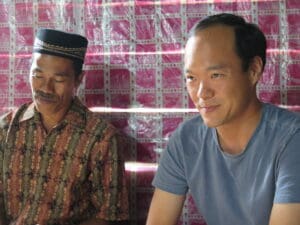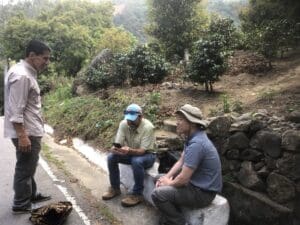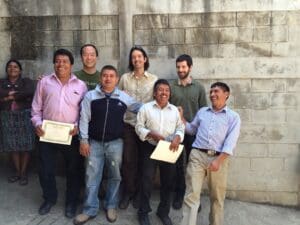A highlight of AAPI celebrations at Atlas this May was interviewing the beloved, incomparable Al Liu, a former Atlasian and dear friend of the Atlas team. He answered questions about his time at Atlas and his experience as an Asian-American coffee professional.

Al (right) with one of our partners during a visit to Sumatra in 2014.
Chelsey Walker-Watson: Can you tell us about your time at Atlas? Did you have any favorite countries to visit or especially dear producer relationships?
Al Liu: I started at Atlas in January 2008 after working for seven years at Colectivo Coffee Roasters, which was called Alterra back then. My first year and a half as an Atlasian were spent learning about the importing side of the specialty industry, processing incoming orders, and meeting roaster clients. In mid-2009, I took my first sourcing trip to Sumatra, which ended up becoming one of my main origins, and over the following few years, I focused on developing supply chains there as well as in Central and South America. Most of my work was with Fair Trade cooperatives, but in the fall of 2014, my duties as a trader expanded, and I started sourcing conventional coffees as well.
During my travels, I got to know many producers and exporters and have been fortunate to carry some of those relationships to Colectivo. I love visiting all origins but have especially deep connections to our producer partners in Brazil, Colombia, Guatemala, and Indonesia. Henrique Dias Cambraia and Fabrício Andrade of long-time Atlas supplier SanCoffee in Brazil are dear friends I've known for almost 15 years, and I look forward to seeing them every year at SCA Expo.
Chelsey Walker-Watson: How did you transition back to Colectivo? What is your role there?
Al Liu: I returned to Colectivo and Milwaukee in the spring of 2016 after more than eight years at Atlas. I had remained in regular contact with the Colectivo owners, and they asked me...to come back as the green buyer. It was not something that I had done when I was with the company in the 2000s, and I would never have attained this position had I not cut my teeth in green coffee as an Atlasian. In addition to doing the green buying here, I work with various departments on coffee education & training, communications, and marketing.

Al shares, "In this photo, I'm talking to Juan Francisco Pira (middle) and Eliseo Cortez (left). JFP is the source of the Guatemala Monja Blanca and also processes the cherries for a loosely-organized producer group to whom he introduced us (Colectivo) four or so years ago. The producer group is based in the Municipality of San Pedro La Laguna on the southwest corner of Lago de Atitlán, and we sell their coffee under the brand 'Quetzal.' Eliseo is the leader of the producer group and has been instrumental in building this supply chain."
Chelsey Walker-Watson: What has your experience been like as an Asian coffee professional? Has that evolved during your time in the industry or as your role or the place that you are working has changed? For example, have you found a greater sense of community over the years?
Al Liu: I definitely notice more Asian Americans in the specialty industry these days, especially compared to when I first started over 22 years ago. Having grown up in suburban Milwaukee in the 70s and 80s, I was accustomed to being the only person of Asian descent in a classroom and later in a bar, conference room, or wherever. Therefore the lack of representation in specialty coffee wasn't unusual for me because I've always been in those environments, but at the same time, I was still very aware of it. Since I am on the older side (I turn 50 later this year!) and live in a medium-sized Midwestern city, I can't say that I'm plugged into the wider community of Asian Americans and Asian Canadians working in specialty coffee. I know that it's started to coalesce, though, and recently I discovered the informal network "Coffee Asians" on Instagram and was amazed that the group gathered in person for the first time at last year's Expo in Boston and again in Portland.
When I began traveling to origin in the early 2000s, I realized that the vast majority of producers - particularly small-scale ones - had no notion of the United States as a multi-racial/ethnic society. I can't tell you how many times I've met producers and exporters in Latin America who have been visibly confused about why someone with my features speaks to them in Spanish. They typically assume that I'm actually from Asia, and sometimes it doesn't come out until later in the visit that I'm not. It occasionally can get tiresome having to explain my roots as an American of Asian descent; however, prior to starting in coffee, I had served as a Peace Corps Volunteer in Bolivia, so I was already accustomed to having to do that.
Chelsey Walker-Watson: Do you have any thoughts or feelings about Asian coffee to share with us?
Al Liu: I don't know if my feelings about coffees from Asian origins are necessarily "bigger" than coffee from non-Asian origins, but I have had many unique experiences in that part of the world as an Atlas trader and later as a green buyer for Colectivo. One of my roles at Atlas was managing our sales to the Asian specialty market - mainly to South Korea but also to Taiwan, Mainland China, Hong Kong, and Singapore. My identity as an Asian-American helped me in that context because I came in with a deeper, personal understanding of the cultures. I think my physical appearance might have made me more approachable to roasters in that region. When I travel to Indonesia, I feel like I blend in pretty easily, especially given the large presence of ethnic Chinese in the coffee industry there. But I feel very much at home in Latin America as well, even if I stick out.
Chelsey Walker-Watson: Are there any coffee professionals or groups you find inspiring or want to acknowledge?
Al Liu: At the SCA Expo in Portland last month, I was introduced to Sahra Nguyen of Nguyen Coffee Supply by my friend Will Frith (a fellow Asian-American in coffee) and had a chance to talk to her about our respective journeys. I told her I was thrilled to see a fellow coffee professional of Asian descent have so much exposure and visibility on social media. In early March, I was at the National Coffee Association conference in Tampa and met Cheryl Hung of Dig Insights in Toronto, who has more than 15 years of quantitative consumer research experience and was a featured speaker at the Re:co symposium in Portland. We acknowledged that there weren't many people at the event who looked like us.

2015 CODECH Micro-lot Cupping Competition in Huehuetenango, Guatemala. The finalists are standing in front, and Al is in the back (left) with fellow Atlas Traders Chris Davidson (center) and Evan Stockdale (right).
Thank you to Al for connecting and thoughtfully opening up about this experience in coffee. Follow Colectivo Coffee to watch some of his work as the Vice President of Coffee!